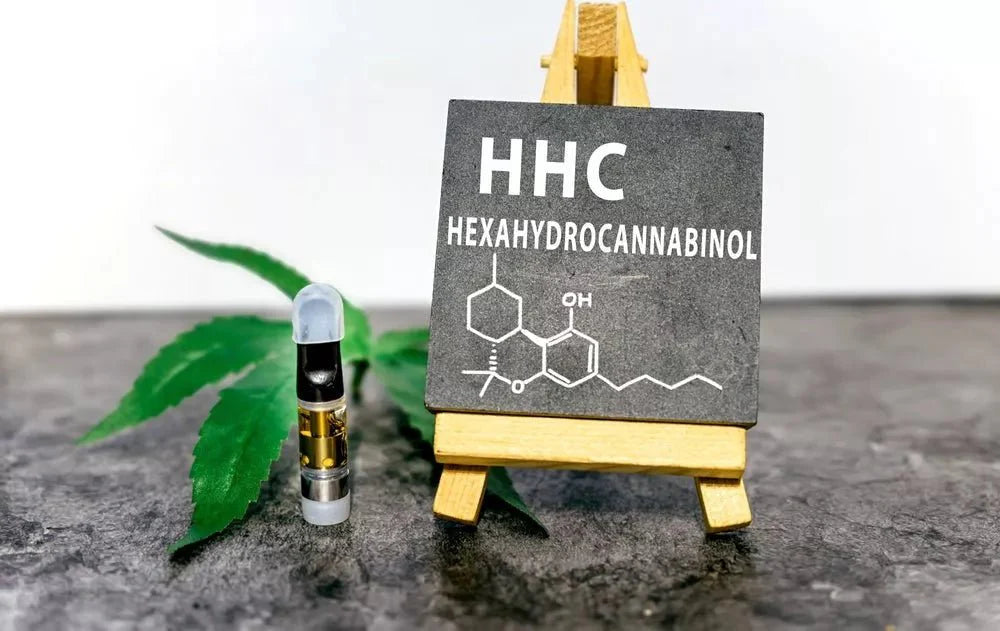Recent posts
-

-
 What Are THCa Diamonds?October 14, 2025
What Are THCa Diamonds?October 14, 2025 -
 Delta 9 Gummies GuideOctober 8, 2025
Delta 9 Gummies GuideOctober 8, 2025 -
 Head High vs Body High: A Guide to Cannabis EffectsOctober 1, 2025
Head High vs Body High: A Guide to Cannabis EffectsOctober 1, 2025 -
 What is THCA Crumble?September 22, 2025
What is THCA Crumble?September 22, 2025 -
 10 Ways to Elevate Self-Care Awareness MonthSeptember 14, 2025
10 Ways to Elevate Self-Care Awareness MonthSeptember 14, 2025

What is HHC: The Ultimate Overview
By Zero Point
Table of Contents
Hexahydrocannabinol (HHC) is a novel cannabinoid that has recently gained attention in the cannabis industry. As a compound with unique properties and potential benefits, it is a promising alternative to traditional cannabinoids like THC and CBD. In this guide, we'll provide a comprehensive overview of HHC, explore its chemistry, discuss the extraction process, and delve into its potential benefits.
HHC: A Deep Dive into Its Chemistry
HHC is a fully hydrogenated derivative of THC, the primary psychoactive compound in cannabis. The hydrogenation process replaces the double bonds in THC with single bonds, resulting in a more stable and less reactive molecule. HHC's chemical formula is C21H30O2, and its IUPAC name is 6aR,9R)-6a,7,8,9,10,10a-hexahydro-6,6,9-trimethyl-3-pentyl-6H-dibenzo[b,d]pyran-1-ol.
This conversion to HHC has several implications, including a reduced psychoactive effect and a potential increase in therapeutic properties. In addition, its unique molecular structure may provide new insights into the endocannabinoid system and its various receptors.
HHC vs THC and CBD: Understanding the Differences
Psychoactive Effects
HHC is distinct from THC in terms of psychoactive effects. While THC is known for its intoxicating properties, HHC exhibits a milder psychoactive effect. This makes it an attractive option for individuals who want to experience the potential benefits of cannabinoids without the intense "high" associated with THC.
Therapeutic Properties
HHC shares some therapeutic properties with both THC and CBD, such as potential anti-inflammatory, analgesic, and anti anxiety effects. However, it may also have unique properties due to its distinct molecular structure. These properties could potentially make it more effective for certain conditions or offer new therapeutic avenues to explore.
Interaction with the Endocannabinoid System
The endocannabinoid system (ECS) is a complex network of receptors, enzymes, and endogenous cannabinoids that play a crucial role in maintaining homeostasis in the body. Both THC and CBD interact with the ECS, primarily targeting the CB1 and CB2 receptors. HHC, with its unique molecular structure, may interact differently with these receptors or other components of the ECS, potentially offering new insights into the system's function and mechanisms.
Potential Benefits of HHC
While research on is still in its early stages, preliminary studies and anecdotal evidence suggest several potential benefits:
- Reduced psychoactivity: HHC may offer a more balanced and manageable psychoactive experience compared to THC, making it an appealing choice for those who prefer milder effects.
- Anti-inflammatory properties: Like CBD and THC, HHC may help reduce inflammation, potentially making it useful for conditions such as arthritis, inflammatory bowel disease, and autoimmune disorders.
- Pain relief: HHC's potential analgesic properties may provide relief from various types of pain, including neuropathic and nociceptive pain.
- Anxiety and stress relief: HHC may offer anti-anxiety effects, making it a potential option for managing stress and anxiety-related disorders.
- Neuroprotection: Early research suggests that HHC may have neuroprotective properties, potentially helping to prevent or slow the progression of neurodegenerative diseases like Alzheimer's and Parkinson's.
HHC Legality and Safety
As a novel cannabinoid, HHC's legality varies depending on the jurisdiction. In the United States, when derived from hemp (containing less than 0.3% THC) is federally legal under the 2018 Farm Bill. However, individual states may have their own regulations, so it is essential to familiarize yourself with local laws before purchasing or using HHC products.
Regarding safety, preliminary research and anecdotal reports suggest that HHC is generally well-tolerated with few side effects. However, as with any cannabinoid, it is crucial to start with a low dose and gradually increase to find the optimal dosage for your specific needs. Always consult with a healthcare professional before incorporating it into your wellness routine, especially if you are pregnant, nursing, or taking medications.
Conclusion
Hexahydrocannabinol (HHC) is an intriguing cannabinoid with a unique molecular structure and promising potential benefits. As a milder alternative to THC, it may offer therapeutic properties such as anti-inflammatory, analgesic, and anti-anxiety effects without the intense psychoactive experience. While research is still in its infancy, this novel compound presents an exciting opportunity for further exploration and development within the rapidly evolving cannabis industry.








